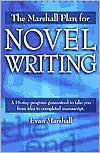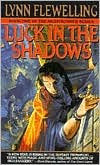Tuesday, April 21, 2009
The Marshall Plan 1: It's Better to Have a Plan
I read literally every single review on Amazon of The Marshall Plan for Novel Writing, by Evan Marshall. I wanted to understand how others see the book and the plan that it offers. Most reviews were very positive. A smaller number of them were critical. The primary issue in the critical reviews was the belief that you shouldn't plan a novel using a template. Novels are unique, and each must be written according to its own dictates. By using a standard template to map out sections and sequence various scenes based on point-of-view characters, you would either end up with garbage or a manuscript that was so superficial that readers would never buy into it. The idea that the "art" that is novel-writing could be reduced to a formula was patently offensive to some reviewers.
I'm not one of them. I think the plan is great.
Many aspiring writers complain they can't work from a plan because it constrains them. They need to let the story flow, and follow it wherever it takes them. When they try to map things out and then follow their notes, or outlines, they feel hemmed in. I used to feel that way, too, until I realized that the plan, the outline I was attempting to follow, was not imposed on me from without. It was my plan. I had created it. The notes, outlines, etc., were just a written reminder of the ideas I had come up with, the very same ideas I had decided I wanted to write about.
When I realized this, and kept writing, I found my resistance to following a plan slipping away. In its place came a satisfying sense of calm. I was able to write with a sense of assurance that I knew what I was writing and where it was taking me. I could still change things along the way, but at least I knew the story and was less apt to get lost. Any changes were either minor details, the scenery along the way, or if they were truly significant story changes, then I could stop, revisit the plan, and understand what other things needed changing in order to accommodate the new inspiration.
Planning saves time in the long run. A month spent thinking about your story, brainstorming, writing notes, developing a basic plot outline, and then fleshing out individual scenes (or sections, as we shall see), is time well spent. Once you know your story, you can focus on telling it, rather than bearing the burden of creating your story at the same time you're trying to write it.
There will always be those who prefer not to plan, but I no longer feel sorry for them when I hear how they struggle, going in circles, writing chapters only to toss them once they realize they don't fit into the ever-evolving story. I no longer pity writers who complain they don't know where their story is headed, or what to write next. I deal with those same questions, of course, but I hit them head-on up front and answer them before I begin writing. I know where I'm headed, where the story is headed, where each character is headed. And, having a detailed plan means each scene is focused. It means you can focus on telling it in the most effective manner, rather than trying to figure out who the point-of-view character is, or what his/her goal really is, etc., while writing.
So, my first point in my in-depth review of The Marshall Plan, and the new software based on it, is that having a plan is a good thing. A template that can help you shape your ideas into a workable plan is a valuable tool. It will save you from poking around in the dark trying to find your own way. It will save you time, allowing you to focus on getting your story written. It will reduce the frustration and increase the tangible progress.
Furthermore, Evan Marshall, a professional editor, surveyed best-selling novels and well-written, successful fiction when he developed the plan. If you conduct your own survey, you will find that the advice he gives is followed by best-selling authors. They may or may not have read his book, but they are adhering to the same key ideas about plot and style.
And the cookie-cutter criticism? I don't share it. The template is a starting point. It provides a solid, basic, generic plan that works. If you haven't yet produced a commercially-viable novel, then you should take a good look at a plan that works. You can try it out, learn from it, improve your skills, and once you have the template down, you can change it as needed to reflect the particular needs of a given story. But before breaking the rules, it's good to learn the rules, the same rules that successful novelists follow. This plan can help you do that.
Adrian
Subscribe to:
Post Comments (Atom)








1 comment:
I bought the book and am reading it, but have had no luck finding the Workbook. I'm hoping it can help me with writing A Lamentation of Swans. d:)
Post a Comment